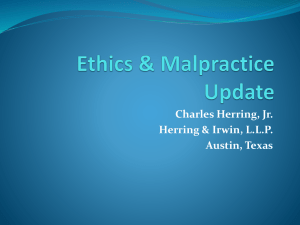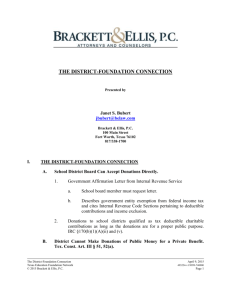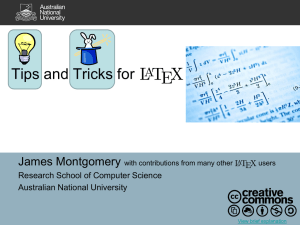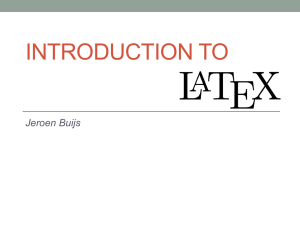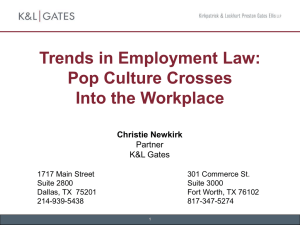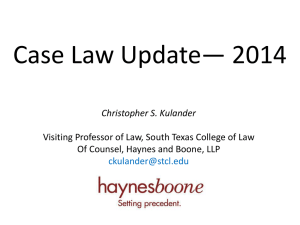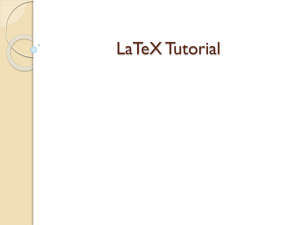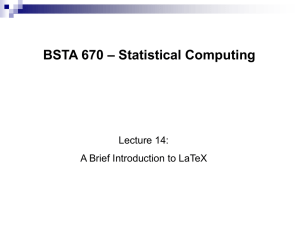Sawicki & Lauten, LLP Attorney`s Fees
advertisement
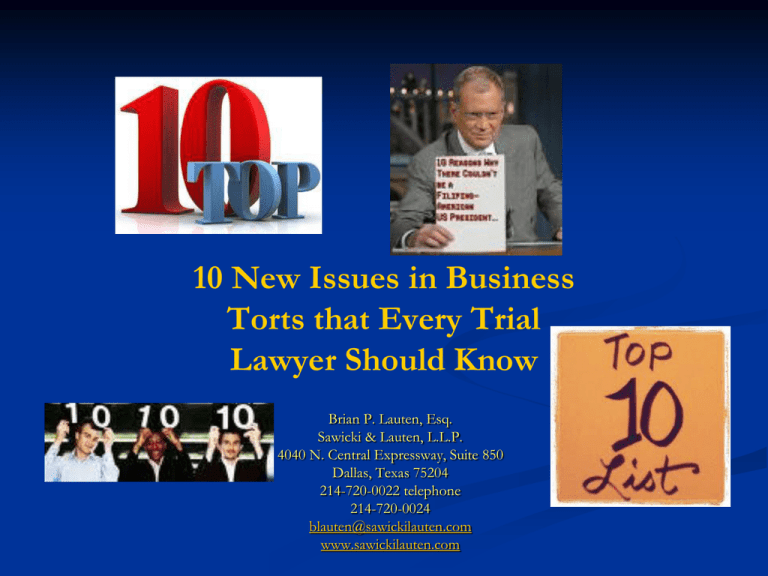
10 New Issues in Business Torts that Every Trial Lawyer Should Know Brian P. Lauten, Esq. Sawicki & Lauten, L.L.P. 4040 N. Central Expressway, Suite 850 Dallas, Texas 75204 214-720-0022 telephone 214-720-0024 blauten@sawickilauten.com www.sawickilauten.com No. 1: New Voir Dire Standards Seth Hill found to be a violent sexual predator. Trial court refused to allow Hill’s attorney to inquire about his homosexuality and whether the jury would convict alone based on prior sexual offenses without reference to the second prong of behavioral abnormality. Supreme Court held reversible error. “A court abuses its discretion when its denial of the right to ask a proper question prevents determination of whether grounds exist for cause or denies intelligent use of preemptory challenges.” In re Commitment of Hill, 334 S.W.3d 226 (Tex. 2011) Sawicki & Lauten, L.L.P. Is Hyundai good law? Supreme Court held that it was reversible error to disallow Hill’s lawyer from asking the jury whether they would require the State to prove both elements of a conjunctive statute. Held: not an improper commitment question. Error preserved simply by asking a proper question that would have allowed for the “intelligent use of preemptory challenges” and receiving a direct ruling rejecting the inquiry. See Hill, 2011 WL 836933 at *1. Opinion cites Babcock v. NW. Memorial Hosp., 767 S.W.2d 705, 709 (Tex. 1989) (Mauzy, J.) for the proposition that a Court may not foreclose upon a proper line of voir dire questions. Sawicki & Lauten, L.L.P. No. 2: Breach of Fiduciary Duty Equitable Forfeiture/No Actuals Needed 1. 2. ERI Consulting, Inc. v. Swinnea, 318 S.W.3d 867 (Tex. 2010), Courts may disgorge ALL ill-gotten profits from a fiduciary when the fiduciary agent usurps an opportunity belonging to a principal or competes with a principal. Equitable forfeiture including all contractual consideration may be awarded for breach even if NO actual damages proven Court adopts a 5 factor test in determining an equitable remedy: (1) whether the trustee acted in good faith; (2) whether the breach of trust was intentional, negligent, or without fault; (3) whether the breach of trust related to the management of the whole trust or just part; (4) whether the breach caused a loss; and (5) whether the trustee’s services were of value Sawicki & Lauten, L.L.P. Number 3 From Prudential (1995) to Prudential (2011) Can Parties Contract away their own fraud? 1. 2. It depends. The enforceability of a waiver of reliance provision in an agreement, under certain circumstances, can conclusively negate the element of reliance barring a later claim for fraud and fraudulent inducement Prudential v. Jefferson, 896 S.W.2d 156 (Tex. 1995). An “as is” agreement may preclude any argument that the seller proximately caused damages. Save and except: (i) fraudulent concealment by the seller and (ii) buyer not bound by “as is” if purchaser’s right to an inspection impaired by the seller. Sawicki & Lauten, L.L.P. Sandwiched in the Middle Schlumberger 1. 2. In 1997, the Texas Supreme Court in Schlumberger v. Swanson, 959 S.W.2d 171 (Tex. 1997) held that the two exceptions in Prudential are still legally enforceable, BUT fraudulent inducement did not prevent the court from enforcing a waiver of reliance provision in a settlement agreement. The contract and the circumstances surrounding its formation determine whether the disclaimer of reliance is binding. Because the parties were attempting to put an end to their deal, and had become embroiled in a dispute over the value of the project, the disclaimer of reliance negates the element of reliance; and therefore, no fraud claim. Sawicki & Lauten, L.L.P. The Day that Fraud Died Sort of 1. 2. In Forest Oil Corp. v. McAllen, 268 S.W.3d 51 (Tex. 2008), the Texas Supreme Court held that an unambiguous waiver of reliance provision in a settlement agreement precluded a fraudulent inducement claim as a matter of law. The Test from Forest Oil: (a) whether the contract was negotiated rather than boilerplate; (b) represented by counsel; (c) arms length transaction; (d) parties knowledgeable in business matters; and (e) release language is clear Sawicki & Lauten, L.L.P. Prudential….We’re back…. 1. 2. In Italian Cowboy v. Prudential Ins., 341 S.W.3d 323 (Tex. 2011), the Texas Supreme Court reversed and held that Forest Oil did not bar a claim for fraudulent inducement based upon a merger clause and language stating that the landlord was making no representations other than those in the agreement. Held: A “no representations” clause does not equal waiver of reliance. Parties must unequivocally disclaim reliance. No. 4. on the Top 10 List New Causation Standards in Business Tort Cases? 1. 2. 3. 4. In Ford Motor Co. v. Ledesma, 242 S.W.3d 32 (Tex. 2007), trial court committed reversible error in submitting a pattern jury instruction on producing cause in a products liability case. Ledesma held that producing cause “is a substantial factor that brings about injury and without which the injury would not have occurred.” Court reasoned that “efficient” and “exciting” are adjectives foreign to the English language and in explaining causation. Transcontinental v. Crump, 330 S.W.3d 211 (Tex. 2010); Lancer v. Garcia, 2011 WL 2586878 (Tex. 2011) Wal-Mart Stores, Inc. v. Merrell, 313 S.W.3d 837 (Tex. 2010) no evidence of causation where expert failed “to explain or adequately disprove alternative theories of causation [making] his own theory speculative and conclusory.” But what about more than one proximate cause? Sawicki & Lauten, L.L.P. No. 5: Attorney’s Fees in a Mixed Contract/Tort Case 1. 2. 3. Tony Gullo Motors v. Chapa, 212 S.W.3d 299 (Tex. 2006). Parties are required to segregate fees between time spent on recoverable claims versus non-recoverable. Save and except, inextricably intertwined claims. Medical City Dallas v. Carlisle Corp., 251 S.W.3d 55, 63 (Tex. 2008) held that attorney’s fees could be recovered for breach of an express warranty. AMX Enterprises LLP v. Master Realty, 283 S.W.3d 506 (Tex. App. – Fort Worth 2009, no pet. h.). In an issue of first impression, in house counsel can recover attorney’s fees at a market rate for outside counsel, even though salaried employees. Sawicki & Lauten, L.L.P. Attorney’s Fees: Who is the Prevailing Party? Intercontinental v. KB Home, 295 S.W.3d 650 (Tex. 2009), a standalone finding of breach of contract with no actual damages awarded does not confer “prevailing party” status. Court adopts a no-harm/no-fee rule. Must have actual damages or an equitable judgment. BUT may define “prevailing party” differently in the agreement MBM Financial Corp. v. Woodlands Operating Co., 292 S.W.3d 660 (Tex. 2009) the Court held that there was legally insufficient evidence of $1,000 in damages; therefore, the Court vacated an award of $149,000 in fees. The Court also held that declaratory relief could not sustain attorney’s fees because there was insufficient evidence on the contract claim Sawicki & Lauten, L.L.P. No. 6: Chapter 41 Repealed Capping the Unlimited Caps 1. 2. 3. Bennett v. Reynolds, 315 S.W.3d 867 (Tex. 2010) reversing $1.25M in uncapped exemplary damages for felony cattle theft. Held: even the $200,000 cap too much Constitutional due process 4:1 ratio between exemplary damages and actuals is borderline appropriate, but maybe not Adopts 5 point reprehensibility factors: (1) harm inflicted physical rather than economic; (2) tortious conduct showed a reckless disregard for safety; (3) target of the conduct had financial vulnerability; (4) repeated actions or isolated incident; (5) harm resulted from malice, trickery or deceit, rather than mere accident Sawicki & Lauten, L.L.P. No. 7: Where are we Litigating? An Update on Forum Selection Clauses 1. 1. Forum selection clauses are generally enforceable and a party seeking to avoid the clause bears a “heavy burden.” Test: (i) clause is invalid for fraud or overreaching; (ii) enforcement would be unreasonable or unjust; (iii) enforcement would contravene a strong public policy of the forum; (iv) and the selected forum would be seriously inconvenient. The Texas Supreme Court is frequently granting mandamus and enforcing forum selection clauses. In Re International Profit Associates, 274 S.W.3d 672 (Tex. 2009); ADM Investor Services, 304 S.W.3d 371 (Tex. 2010); In re Lisa Laser USA, Inc., 310 S.W.3d 880, 883-887 (Tex. 2010). Sawicki & Lauten, L.L.P. No. 8: Bye-bye Jury Trial Hello Arbitration New Case Law 1. 2. 3. A delegation provision in an arbitration agreement providing that the arbitrator decides whether the arbitration clause is enforceable rather than the Court is legal and enforceable. Rent-A-Center, West, Inc. v. Jackson, 130 S.Ct. 2772, 2779-2780 (2010) (Scalia) Labatt Food Service, L.P., 279 S.W.3d 640 (Tex. 2009) and In Re Jindal Saw Limited, 289 S.W.3d 827 (Tex. 2009). Wrongful death beneficiaries bound by agreements to arbitrate signed by their deceased loved one even though they were nonsignatories to the agreements. Because wrongful death beneficiaries stand in the legal shoes of the decedent, they are bound by the agreements signed by the deceased (even if non-parties). Sawicki & Lauten, L.L.P. No. 9: Shareholder Oppression Officers and Directors in closely held company refused to meet with potential purchasers of minority stock holder which defeated any reasonable expectation of marketing the stock to a third party. Dallas Court of Appeals held that a court ordered buy back of stock is an appropriate remedy in an oppression case. Receivership is a remedy, but only if all other remedies fail. Court held the refusal to meet with potential purchasers was a “visible departure from standards of fair dealing and a violation of fair play.” Court held the appropriate value for the buy back is fair market value including discounts for lack of marketability and for the stock’s minority position. Ritchie v. Rupe, 339 S.W.3d 275 (Tex. App. – Dallas 2011, pet. denied) (Moseley, J.). No. 10: A New Tort of Conversion and Disgorgement 1. Texas Mutual Insurance Co. v. Ledbetter, 251 S.W.3d 31 (Tex. 2008). Ledbetter electrocuted and killed. Settlement reached for 4.5 million. Before minor-prove up, carrier intervened. Plaintiffs non-suit all claims but the Estate. Texas Supreme Court reversed. Held: when an injured worker settles without reimbursing the carrier everyone is liable to the carrier for conversion including disgorgement. Plaintiffs were even precluded from a non-suit without the carrier’s permission. Sawicki & Lauten, L.L.P.
